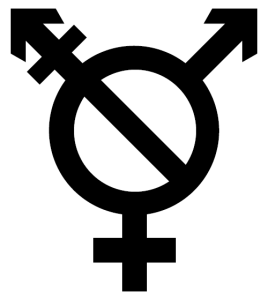Posted on: April 1st, 2016 by Amy Lynn Smith
This story series began, like most ideas, with a confluence of inspiration.
 With transgender people increasingly in the spotlight, their lives have become more visible — but not entirely visible. Many Americans only see what the public eye will allow. Celebrities like Laverne Cox and Caitlyn Jenner may help raise awareness, but they certainly don’t tell the whole story of the transgender community. I don’t pretend that my new series can tell the whole story, either, but it will look at the real lives of transgender people living in our communities instead of in the glare of the media.
With transgender people increasingly in the spotlight, their lives have become more visible — but not entirely visible. Many Americans only see what the public eye will allow. Celebrities like Laverne Cox and Caitlyn Jenner may help raise awareness, but they certainly don’t tell the whole story of the transgender community. I don’t pretend that my new series can tell the whole story, either, but it will look at the real lives of transgender people living in our communities instead of in the glare of the media.
The first inspiration for this series came from conversations with people I know. Although they fully embrace LGBT equality, they expressed a sincere desire to know what being transgender means. “I’m completely supportive,” one friend told me. “I just wish I understood it.” To be honest, I felt the same way a year ago. I am always learning from my transgender friends, and I have learned a great deal more by working on this series.
The second inspiration was the ACLU of Michigan’s Transgender Advocacy Project, spearheaded by the amazing activist and transgender woman Amy Hunter. Here’s what motivated me, in Hunter’s own words:
The transgender community will be pivotal in the [LGBT community’s] continued fight for social, economic and cultural equality.
Transgender people here in Michigan and other states are inarguably among the most at-risk segments of our society. According to the report “Injustice at Every Turn,” transgender Americans—particularly transgender women of color—face rates of violence, poverty, unemployment, homelessness, and suicide that are unthinkable for most Americans. If we are to stem the staggering tide of discrimination and violence my community faces, transgender people too must win the hearts and minds of the American public. We must amplify the cries of a community that has struggled to be heard.
And that’s why the Transgender Advocacy Project was conceived—to lift up the voices of everyday transgender Michiganders. …
They need to be heard by our friends and our co-workers, by the media and our policymakers.
The Transgender Advocacy Project is designed to help Michigan’s transgender residents utilize their experiences to educate the rest of our state about who they are and why their lives matter and to advocate both for themselves and for their community.
When I learned about this storytelling aspect of the Transgender Advocacy Project, I wanted to help. And Eclectablog provides a platform to help elevate the voices of transgender people.
 For this series, I’ve spent hours interviewing members of the transgender community and their allies, all participants in the Transgender Advocacy Project, who graciously and fearlessly shared their personal stories with me. I say “fearlessly” because it takes a great deal of courage to live openly as a transgender person, knowing that you could be fired, denied housing — or worse — because Michigan does not have any protections for LGBT people in its Elliot-Larsen Civil Rights Act (ELCRA). As I write this, new legislation is being proposed in the Michigan Legislature that would allow blatant discrimination against transgender people, Michigan’s own “bathroom bill.”
For this series, I’ve spent hours interviewing members of the transgender community and their allies, all participants in the Transgender Advocacy Project, who graciously and fearlessly shared their personal stories with me. I say “fearlessly” because it takes a great deal of courage to live openly as a transgender person, knowing that you could be fired, denied housing — or worse — because Michigan does not have any protections for LGBT people in its Elliot-Larsen Civil Rights Act (ELCRA). As I write this, new legislation is being proposed in the Michigan Legislature that would allow blatant discrimination against transgender people, Michigan’s own “bathroom bill.”
The rash of “bathroom bills” being introduced across the country count on misinformation and a lack of understanding. The supporters of these discriminatory bills rely on people believing the lie that transgender people are predators or deviants, which is absolutely untrue. A transgender person is much more likely to be the victim of violence in a public bathroom and not the perpetrator. I’ve shared a public bathroom with transgender women and didn’t give it a second thought. We stood at the mirror together touching up our makeup, and it was no different than any other experience I’ve ever had in a women’s bathroom.
I share Hunter’s belief that personal stories can dispel stereotypes and discriminatory beliefs, and increase understanding and empathy. So in this series, I’ll be helping transgender people and their allies tell their own stories so readers can get to know them. The fact is, you probably already know someone who is transgender and don’t even realize it. That has been true for me. And the more we learn about our transgender friends and neighbors, the more we can remove any perceived barriers that create divisions of “us” and “them.”
Their stories will demonstrate the significant challenges transgender people face in a society where they are still woefully misunderstood — and often vilified as a result. But they will also reveal what is clear from every conversation I’ve ever had with transgender people: They are people, first and foremost.
Transgender people have the same hopes and dreams as anyone else. They want nothing more than to be loved for who they are — who they really are, which they have sometimes kept hidden for decades. They want to have fulfilling careers and loving relationships. They want to live their lives out in the open, without fear of discrimination or worse.
Every one of the people I interviewed is unique, just like every other human being. The only thing they have in common is being transgender — and feeling like the gender they were assigned at birth doesn’t match who they are inside and how they long to present themselves to the world. It’s something each of them knew from an early age, even if they didn’t quite understand what it meant. However long they tried to hide it — from the world that might judge them or even from themselves — eventually they all recognized that they would never be happy until they could live authentically.
There’s actually a clinical definition for the emotional and psychological burden of being assigned a gender at birth that’s incompatible with the gender you identify with: gender dysphoria. Medical societies recognize that gender dysphoria isn’t treated by forcing someone to conform to the gender they were assigned at birth, but by addressing these conflicted feelings. Most transgender people turn to counseling, and many others also choose to transition physically using hormones and, perhaps, sex reassignment surgery. The choice is as unique as each individual, but the ultimate goal is to express the gender they identify with in their heart and soul, not by biological assignment.
The remedy for gender dysphoria is to live authentically.
That’s the other thing the people I interviewed have in common: They have the courage to live authentically. Even for those of us who don’t grapple with our gender identity, living authentically is one of the hardest things any of us will ever do. The transgender people and allies I interviewed are doing that, in the most remarkable of ways given how transgender people are often still perceived and treated by society.
It’s my hope to help change that. Transgender people are people, they are our fellow human beings. By recognizing that, and understanding who they are, we can foster acceptance and empathy.
Everyone involved in this project has my utmost respect and gratitude. I look forward to sharing their powerful stories.
You’ll find all of the stories HERE.
This post originally appeared at Eclectablog, where the story series will be hosted.
[Top photo courtesy of Char Davenport].
 What began as an effort to counteract the malicious misinformation that was being spread by opponents of the ACA has evolved into an initiative to help protect the ACA, which is facing its greatest menace: a President-elect who has promised to turn Congress’ continual threats to repeal the law into a reality.
What began as an effort to counteract the malicious misinformation that was being spread by opponents of the ACA has evolved into an initiative to help protect the ACA, which is facing its greatest menace: a President-elect who has promised to turn Congress’ continual threats to repeal the law into a reality.
 With every step forward in trans equality — and there have been many of late — there continues to be a backlash that is bred through ignorance and fear.
With every step forward in trans equality — and there have been many of late — there continues to be a backlash that is bred through ignorance and fear. With transgender people increasingly in the spotlight, their lives have become more visible — but not entirely visible. Many Americans only see what the public eye will allow. Celebrities like Laverne Cox and Caitlyn Jenner may help raise awareness, but they certainly don’t tell the whole story of the transgender community. I don’t pretend that my new series can tell the whole story, either, but it will look at the real lives of transgender people living in our communities instead of in the glare of the media.
With transgender people increasingly in the spotlight, their lives have become more visible — but not entirely visible. Many Americans only see what the public eye will allow. Celebrities like Laverne Cox and Caitlyn Jenner may help raise awareness, but they certainly don’t tell the whole story of the transgender community. I don’t pretend that my new series can tell the whole story, either, but it will look at the real lives of transgender people living in our communities instead of in the glare of the media. For this series, I’ve spent hours interviewing members of the transgender community and their allies, all participants in the Transgender Advocacy Project, who graciously and fearlessly shared their personal stories with me. I say “fearlessly” because it takes a great deal of courage to live openly as a transgender person, knowing that you could be fired, denied housing — or worse — because Michigan does not have any protections for LGBT people in its Elliot-Larsen Civil Rights Act (ELCRA). As I write this,
For this series, I’ve spent hours interviewing members of the transgender community and their allies, all participants in the Transgender Advocacy Project, who graciously and fearlessly shared their personal stories with me. I say “fearlessly” because it takes a great deal of courage to live openly as a transgender person, knowing that you could be fired, denied housing — or worse — because Michigan does not have any protections for LGBT people in its Elliot-Larsen Civil Rights Act (ELCRA). As I write this, 



